State Rep. Natalie Manley (D-Joliet) voted Wednesday night to bail out Chicago Public Schools (CPS), shifting state school funding from suburban districts.
Senate Bill 1, which passed 60-52 on partisan lines, would send at least $400 million more per year to CPS and take responsibility for funding its insolvent teachers' pension fund.
That fund, as reported by Chicago City Wire last week, is nearly $10 billion in the hole and is expected to run dry early next decade.

State Rep. Natalie Manley (D-Joliet) voted Wednesday night to bail out Chicago Public Schools (CPS)
| Illinois General Assembly
Most Senate and House members voted on the funding distribution measure without knowing how their local school districts would be impacted.
By design, the bill's backers purposely avoided producing a district-by-district analysis ahead of the votes, for fear of losing support from legislators whose schools stood to lose out.
But context clues-- including the strong backing of pro-CPS legislators and lobbyists-- served as plenty of warning for most of them.
The last complete analysis of Senate Bill 1, produced last summer, showed 22 of 29 Will County school districts losing significant state funding.
Communities represented by Manley include Bolingbrook, Northwest Romeoville, Northwest Joliet and Crest Hill.
The analysis said the school districts serving them will lose a combined $9.7 million in annual state funding if Senate Bill 1 became law.
According to the analysis, losing school districts include Indian Prairie 204 (loses $9.8 million), Plainfield 202 (loses $1.4 million), Troy Community Consolidated School District 30 (loses $1.1 million) and Richland 88A (loses $739,756).
Winning districts include Valley View 365U ($2.8 million) and Chaney-Monge 88 ($474,067).
To avoid local school cuts, communities would have to raise property taxes to replace those state dollars.
Bill supporters insisted that the bill analysis was incorrect because they had subsequently added a "hold harmless" provision, which would, at least temporarily, minimize the dramatic cuts to suburban districts.
But that provision also assumed-- and required-- a massive increase in state funding to schools, which is next to impossible given the state's precarious financial situation.
Critics described the concept as spurious.
"(Senate Bill 1) is a disaster and moreover, it is deceptive," said State Rep. Jeanne Ives (R-Wheaton).
----
Is your school district a winner or a loser?
State Rep. Natalie Manley (D-Joliet) voted Wednesday for a measure that would redistribute the state's school funding dollars, shifting money from suburban districts to Chicago.
How would schools in her district-- which includes Bolingbrook, Northwest Romeoville, Northwest Joliet and Crest Hill-- fare?
| State Funding | |||
| District | Current | Proposed | Difference |
| Valley View 365U | $37,636,306 | $40,464,950 | $2,828,644 |
| Plainfield 202 | $74,008,172 | $72,620,874 | -$1,387,298 |
| Indian Prairie 204 | $34,267,494 | $24,436,694 | -$9,830,800 |
| Chaney-Monge 88 | $1,720,957 | $2,195,024 | $474,067 |
| Richland 88A | $919,478 | $179,722 | -$739,756 |
| Troy CCSD 30 | $3,958,740 | $2,900,477 | -$1,058,263 |
| TOTAL | $152,511,147 | $142,797,741 | -$9,713,406 |
Source: Illinois State Board of Education






 Alerts Sign-up
Alerts Sign-up